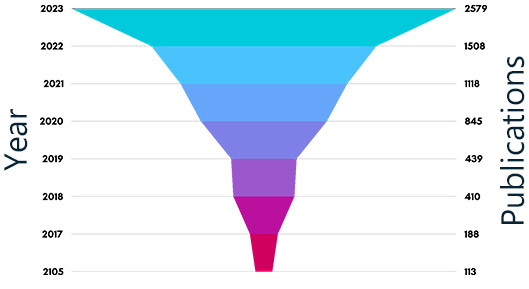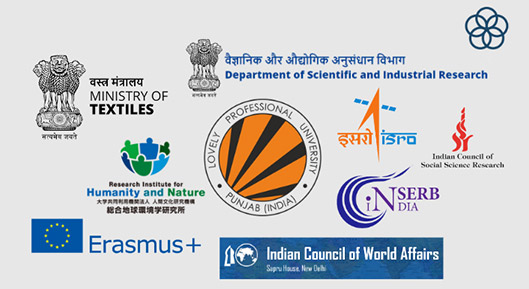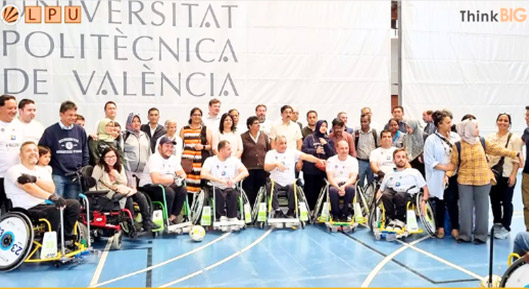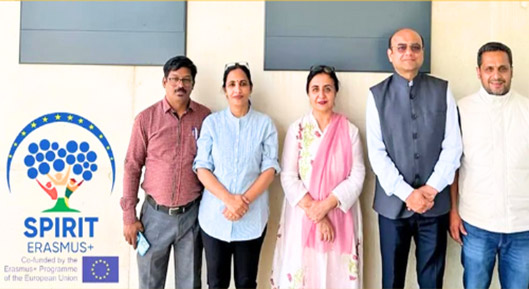Lower-middle Income Countries and Global
127
Countries withResearch Collaboration
32
Lower-middleIncome Countries
150+
CollaboratingOrganizations
9268
Co-authoredPublications
International Collaborators
University researchers have collaborators globally and many low and low-middle income countries. As an outcome LPU has publications with authors affiliated from 127 countries that includes Egypt, Ethiopia, Iran, Nigeria, Jordan, Pakistan, Bangladesh, Morocco, Lebanon, Afghanistan, Papua New Guinea, Algeria, Tunisia, Nepal, Sudan, Ghana, Angola, Uganda, Bhutan, Uzbekistan, Syrian Arab Republic, Philippines, Rwanda, Tanzania, Yemen, Zambia, Cameroon, Kenya, Lesotho, Malawi, Niger, Somalia, Sri Lanka, etc.

LPU Research on SDGs
LPU has collaborated with regional, national and international academic and research institutions, both governmental bodies and non-governmental organizations, to ensures a holistic understanding of sustainable development challenges and encourages the development of innovative and comprehensive solutions. LPU has published articles in collaboration with many low and Lower middle income countries and is continuously working in lines with UN vision towards their growth. Lovely Professional University has increased its publication count on all 17 SDGs by more than 70% in 2023, as comparison to 2022. A few of these countries with partnership of LPU are as in image.
LPU has fostered and witnessed an increase in research output in terms of Field-Weighted Citations Impact [FWCI] of 5-years along with increase in output in Top 10% Journals as depicted by Scival database.

Project Collaborations
LPU has funded projects by partnering with international bodies/organization both governmental and non-government to improve the living standards and achieve sustainable growth. The list of collaborators has focused on all key areas addressed in Sustainable Development Goals and the outcome of these projects have resulted in framing policies and guidelines for healthy life and sustainable growth.
University researchers have partnered with experts from various research fields allows them to tap into a wealth of knowledge, enabling a more profound analysis of problems and the development of effective strategies. Additionally, collaborative efforts promote the sharing of resources, both in terms of funding and infrastructure. Research projects often require substantial financial investment and specialized equipment, which can be shared among collaborating institutions, making research initiatives more sustainable and impactful.
Funded Project Collaborations
Collaboration has provided access to diverse perspectives and experiences. The involvement of international and multicultural teams ensures that research findings are culturally sensitive and applicable to a wide array of communities. This inclusivity strengthens the relevance of research outcomes, especially when addressing challenges related to social inequalities, economic disparities, and environmental sustainability. Collaborative research also accelerates the dissemination of knowledge and best practices, fostering global understanding and awareness of sustainable development issues.
Some of funded projects with impact with respect to SDG are given below:
| Research Project (Title) | Partnership Organization | Focused SDG |
|---|---|---|
| Education proposal Edu-23-00045 National Technical Textile Mission (NTTM) | Ministry of Textile, Govt. of India | 4,8,9 |
| Design of FinFET architectures for analog/RF and biomedical applications | SERB, Govt. of India | 3,9 |
| Evaluating the Socio-economic Impact of Pradhan Mantri Krishi Sinchai Yojana (PMKSY) in select areas Punjab | ICSSR, Govt. of India | 1,5,10,2,8,11 |
| Grant aggrement model for ERASMUS+ Mobality Particepent Higher Education | European Union | 4,16,17 |
| Cybersecurity for all - CS4ALL | Erasmus+: Higher Education - International Capacity Building | 4,8,9,11,16,17 |
| Invitro investigation of the role of antiepileptic drug in oxidative ABC cito activity and potential of alpha lipoic acid as anti-oxidant | SERB, Govt. of India | 3,8,9,12,15,17 |
| Design and Development of Novel and Innovative Hybrid Ball Burnishing Assisted 3-Axis Wire Arc Additive Machine for industrial application | DSIR, Govt. of India | 8,9,11,12,15,17 |
| Development of ferroelectric polymer-2D transition metal dichalcogenide (TMDC) nanocomposites for tunable solid state fractional order capacitors | SERB, Govt. of India | 4,8,9,11,12,15 |
| Assessment of Flouride contamination in ground water in Punjab using GIS and machine learning technique | Indian Space Research Organization | 6,14,15 |
| The Nuclear North-South Divide, Nuclear Apartheid and Problems of Nuclear Security | Indian Council of World Affairs | 8,15,16 |







